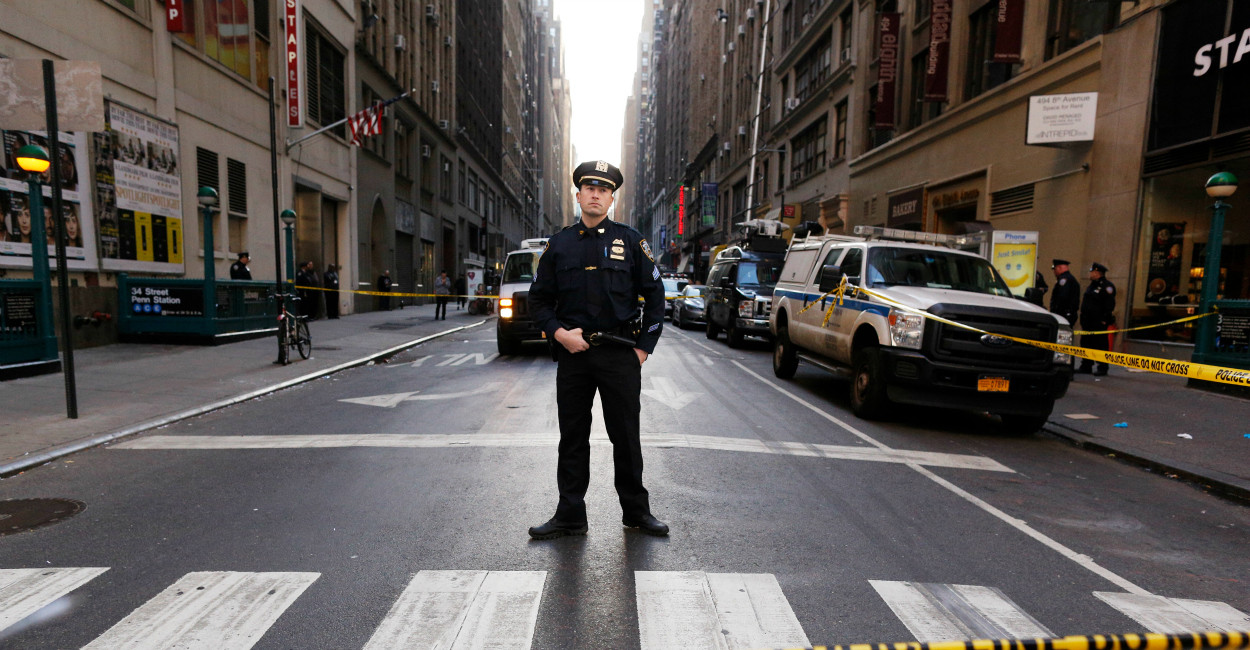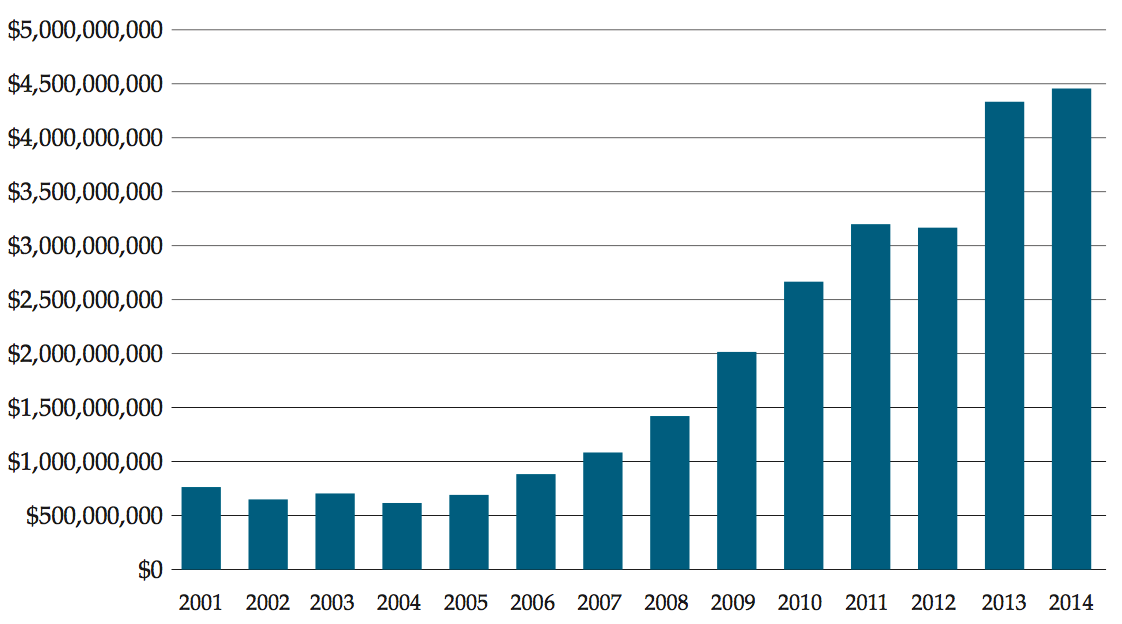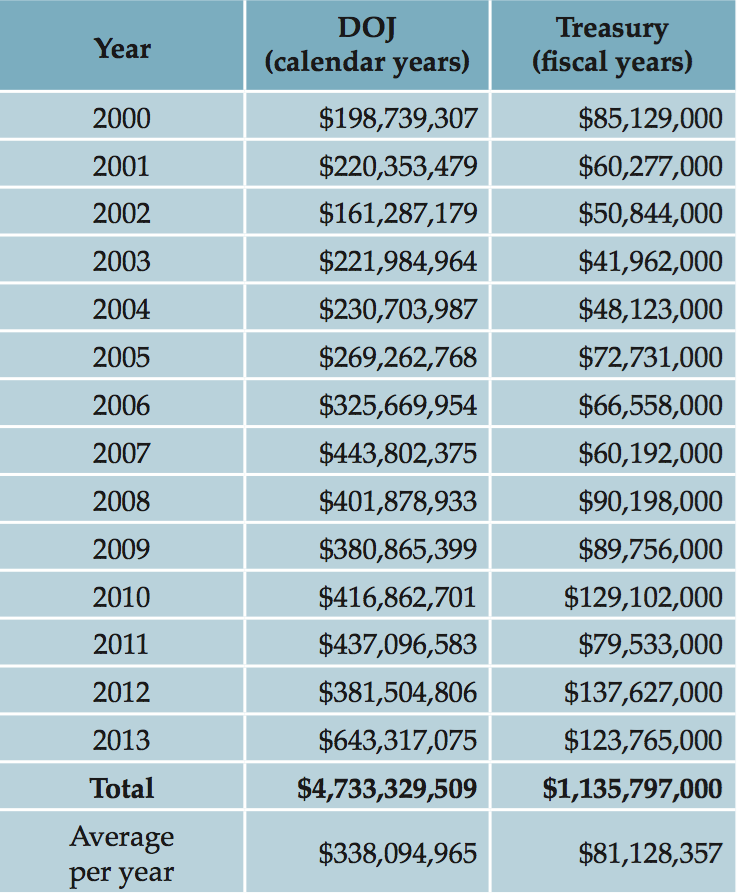Melissa Quinn
Melissa Quinn is a news reporter for The Daily Signal. Send an email to Melissa.
Melissa Quinn / @MelissaQuinn97 / November 12, 2015
http://dailysignal.com/2015/11/12/the-government-netted-4-5-billion...

In 2014, the Justice Department and Treasury Department netted $4.5 billion through civil forfeiture. Civil forfeiture gives law enforcement the power to seize cash, cars and houses if they suspect the property is tied to criminal activity. (Photo: Brendan McDermid/Reuters/Newscom)
For federal state and local law enforcement agencies, a little-known practice giving them the power to take Americans’ property, cash, and cars has proven to be a boon over the last decade.
According to a new report from the Institute for Justice, a public interest law firm, the federal government has seen a substantial increase over the last 13 years in the amount of money deposited into forfeiture funds governed by the Departments of Justice and Treasury—the two federal agencies that typically conduct forfeitures.

Total Net Assets in the Justice Department and Treasury Department’s Forfeiture Funds (Chart: Institute for Justice)
In 2014, the Institute for Justice found that net assets, or what’s left over after expenditures, into the agencies’ forfeiture funds reached $4.5 billion—an increase of more than 4,600 percent from 1986, when the Justice Department’s fund was first created. Net assets in the Justice Department’s and Treasury Department’s forfeiture funds first topped $1 billion in 2007 and have moved upward steadily over the last seven years.
The Daily Signal is the multimedia news organization of The Heritage Foundation. We’ll respect your inbox and keep you informed.
Additionally, from 2001 to 2014, the Justice Department and Treasury Department deposited a combined $29 billion in their respective forfeiture funds, the Institute for Justice found.
“One of the most basic economic principles is that incentives matter, and they matter not just to individuals but also to groups,” the Institute for Justice wrote in its report. “In allowing agencies to keep some or all of what they forfeit, civil forfeiture laws permit, if not encourage, law enforcement to police for profit. And agencies have responded with zeal.”
Civil forfeiture is a tool that gives law enforcement the power to seize cash, cars, and houses if they are suspected of being related to a crime. Originally, the tool was viewed as a way to combat drug trafficking and money laundering. However, as law enforcement budgets have become increasingly strapped for cash—and forfeiture proceeds have increased—civil forfeiture has been dubbed “policing for profit” by critics.
In recent years, a growing number of stories have arisen involving innocent Americans who had property forfeited yet were never charged with a crime. Additionally, civil forfeiture has been called a “gold mine” and “pennies from heaven” by the very law enforcement officials who benefit from the proceeds of cash, cars, and property forfeited.
In just seven states and the District of Columbia, law enforcement is prohibited from accessing forfeiture proceeds. In several of those states, such as Missouri and New Mexico, all of the proceeds from cash, cars, and houses seized go directly into each state’s general fund.
However, in the remaining 43 states, more than 45 percent of forfeiture proceeds are directed back to police departments and prosecutors. At the federal level, agencies using civil forfeiture to seize property can keep 100 percent of the proceeds.
“Giving law enforcement a financial stake in civil forfeiture distorts law enforcement priorities,” the Institute for Justice wrote in its report. “Allowing law enforcement agencies to reap financial benefits from forfeitures encourages the pursuit of property over the impartial administration of justice.”

Percentage of Forfeiture Proceeds State and Local Law Enforcement Agencies Can Keep (Map: Institute for Justice)
Law enforcement’s ability to keep the proceeds from cash, vehicles, and houses seized has provided police and prosecutors with a direct profit incentive, the group warned.
“These allowances represent a significant opportunity for agencies to self-fund through civil forfeiture, and evidence suggests that agencies are taking full advantage,” the group said in its report.
In response to backlash from critics of civil forfeiture, who argue the practice is being abused by law enforcement, more than a dozen states have introduced or passed legislation to protect property owners and make it more difficult for law enforcement to forfeit property from innocent Americans.
Additionally, groups including the Institute for Justice have launched three lawsuits in federal court. One targets the use of civil forfeiture in Arizona, another challenges law enforcement in the District of Columbia, and the third—the Institute for Justice’s—protests civil forfeiture in Philadelphia.
Despite these challenges to civil forfeiture in state houses and the federal courts, law enforcement agencies across the country still have a way to skirt state restrictions on civil forfeiture and adhere to federal forfeiture laws instead.
Through a Justice Department program called Equitable Sharing, law enforcement agencies are subject to federal forfeiture laws through two ways: first, if the conduct leading to the seizure violated federal law, and if local and state law enforcement agencies turn seized property over to the federal government through “adoptions”; and second, if local and state law enforcement agencies work in conjunction with the federal government through joint task forces or investigations.
Law enforcement agencies participating in the Equitable Sharing program receive up to 80 percent of the proceeds from the cash, vehicles, and houses seized, and in 2014, more than 3,000 state and local agencies participated in the program, the Institute for Justice found.

Equitable Sharing Payments from the Justice Department and Treasury Department (Table: Institute for Justice)
From 2000 to 2013, the Justice Department payments to local and state law enforcement agencies participating in Equitable Sharing topped $4.7 billion, according to the group’s report. Additionally, payments tripled from 2000 to 2013.
In January, the Justice Department altered its policies related to the Equitable Sharing program, prohibiting federal adoptions. The Treasury Department followed suit.
Melissa Quinn is a news reporter for The Daily Signal. Send an email to Melissa.
"Destroying the New World Order"
THANK YOU FOR SUPPORTING THE SITE!
© 2026 Created by truth.
Powered by
![]()
You need to be a member of 12160 Social Network to add comments!
Join 12160 Social Network